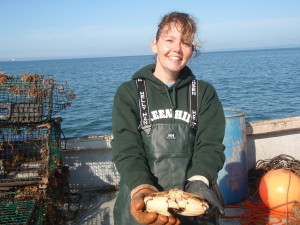Donna Curtis
 1. What is your official current position and title?
1. What is your official current position and title?
Hello, my name is Donna Curtis and I am an Interdisciplinary PhD student at the University of New Brunswick Fredericton campus. Like most graduate students, I work in a variety of academic or teaching positions whenever I can. Currently, I work part-time as an Administrative Coordinator and Information Specialist for the Canadian Fisheries Research Network (www.cfrn-rcrp@unb.ca). I hold a Master’s in Library and Information Studies as well as a Master’s of Science in Environmental Management.
2. What is your educational background?
After finishing library school, I worked in several academic and research library/information specialist positions. It was while setting up a research library for a field station in the Turks and Caicos Islands (TCI) on the small island of South Caicos that I began to understand the role of local and traditional knowledge and their importance in resource management.
3. Talk a little about your career path? Where did your passion for the research/work that you do originate and how did it develop?
When I started my PhD studies at UNBF I was fortunate to be invited to join the Coastal Community-University Research Alliance (www.coastalcura.ca). Through this CURA I was introduced to and worked with fishers and representatives from fishing communities in all three Maritime Provinces. I witnessed first hand how local and traditional knowledge are valued, or often appear undervalued in research and public policy decision-making. I believe however, there must be a way for knowledge, local and traditional and science and technology to be considered simultaneously in resource management.
4. Tell us about one or two of your current projects?
One of my current projects is an examination of web-based databases that are populated with public input on issues relating to oceans and coastal zones in the Maritime region (e.g. whale sighting, debris found on beaches, unusual weather events, etc.). As a comparison, these databases would be similar to the public’s participation in the Christmas bird counts. Without the public’s help and knowledge this important population information could not be captured. This type of information is often referred to as “community” or “citizen science”. My project will involve examining the design of these databases and asking questions such as who contributes to them, what types of information are collected and how the collected information is used towards public policy decision-making.
5. How do you see your research/work in terms of possibly contributing to evidence-based public policy?
Public databases may provide, at least partially, a solution towards offering a safe and neutral opportunity for communities to share their knowledge. Current trends in resource management clearly identify the importance of including the voices of all stakeholders in policy decision-making. However, more often than not information sharing opportunities commonly in the form of “town halls” leave communities feeling as though they were merely “informed” about decisions that have already been made with no legitimate opportunity to share their knowledge and contribute in the decision-making process. Better means must be identified to build trust in the information sharing process and transparency in decision-making. Databases that draw on public and community information and knowledge may be a step in the right direction.
6. Describe in a couple of sentences your involvement with NBSPRN and how your relationship with the Network has contributed to your research/work and/or to social/economic policy?
When I explained my research interest and ideas to Nick Scott at the NBSPRN he was genuinely interested and supportive. That’s been a real encouragement for me and has helped me to move forward.
7. Any last thoughts?
It’s impossible to talk about my research without thanking the fishers, fishermen’s organizations and coastal communities for their willingness to give of their time and share their experiences with me. Some of the projects have even given me the chance to spend time on the boats, which has been amazing. I have learned that boat names have great stories behind them so I always ask where the names come from.




